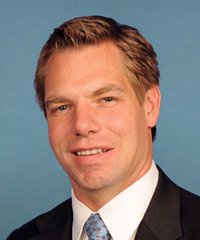
Growing up in what now is California’s Fifteenth Congressional District taught Eric Swalwell a lot about hard work, strong principles, and planning for a brighter future.
The oldest of four boys and son to Eric Sr., a retired police officer, and Vicky, who works as an administrative assistant, Swalwell was raised and attended public schools in the East Bay. A Division I soccer scholarship was his ticket to becoming the first person in his family to go to college. During college, he worked as an unpaid intern in the office of his representative, Congresswoman Ellen Tauscher, and so was on Capitol Hill on September 11, 2001. This inspired his first legislative achievement: using his Student Government Association position to create a public-private college scholarship program for students who lost parents in the attacks.
It's not just about Russia’s 2016 election meddling, intervention in foreign countries, or past ties between them and President Trump’s Administration. It's also about the future of our country, and making sure it is free from Russian interference. However, with President Trump in the White House, that will not be possible. It's clear that he and his team have already been affected by their contact with Russia and have instated more pro-Russia policies than America has seen in decades.
Once one of the strongest anti-Russian hawks, Attorney General Jeff Sessions changed his tune on Russia after twice meeting with Ambassador Kislyak and joining the Trump campaign as a surrogate. Throughout his 19 year Senate career, Sessions had long supported increased military spending to counter Russia and called for policies that would ensure Russia’s threat was dealt with through military strength and not diplomatic talks. In 2010, Sessions voted against the New START Treaty with Russia which called for further nuclear arms reduction between the two countries, arguing that it played into Russia’s hands and made America weaker. In 2014, in response to Russia’s invasion of Ukraine, Sessions called for Russia’s exit from the G8 and for sanctions against Russia.
During the Republican National Convention in July 2016, President Trump and his campaign worked to change the national platform to make their policies more pro-Russian and less pro-Ukraine. In the platform, they decided to no longer call for giving weapons to individuals fighting the Russians in Ukraine. This was in contrast to the position of other Republican leaders. Not only did they not include it in the platform, they also went behind the scenes to shut down delegate amendments calling for tougher Russian sanctions and aid for the Ukrainian military. Therefore, the platform passed at the hands of the Trump campaign was completely at odds with many other Republicans’ stance on Russia, which should be a signal unto itself.
Meanwhile, President Trump himself has made many comments while running for President, and since, that suggest an increasingly cozy relationship with Russia. For example, Trump said “if you get along and if Russia is really helping us, why would anybody have sanctions if somebody’s doing some really great things?” This is in opposition to long standing American policy on sanctions towards Russia, and furthermore, ignores the facts that Russia isn't helping Americans and their policies are antithetical to American interests. Not only that, but he acted on this soon after being sworn in as President, amending sanctions to now allow American technology to be exported to Russia, sanctions put in place during the Obama Administration.
Furthermore, after the intelligence community report came out condemning Russia’s interference in our election, then President-Elect Trump tweeted that the U.S. should want a good relationship with Russia, and thus that we shouldn’t be worried about problems with Russia. He continued in his tweets by saying once he became President, “Russia will respect us far more than they do now.”
Lastly, President Trump has made repeated comments that show a lack of support for NATO, saying that “NATO is obsolete,” and that it is “not as good as it was when it first evolved.” Again, this is in opposition to long standing American and Republican policy, which has been that NATO is completely essential to our foreign and defense policy, and that leaving NATO would do great damage to our European allies, thus strengthening Russia.